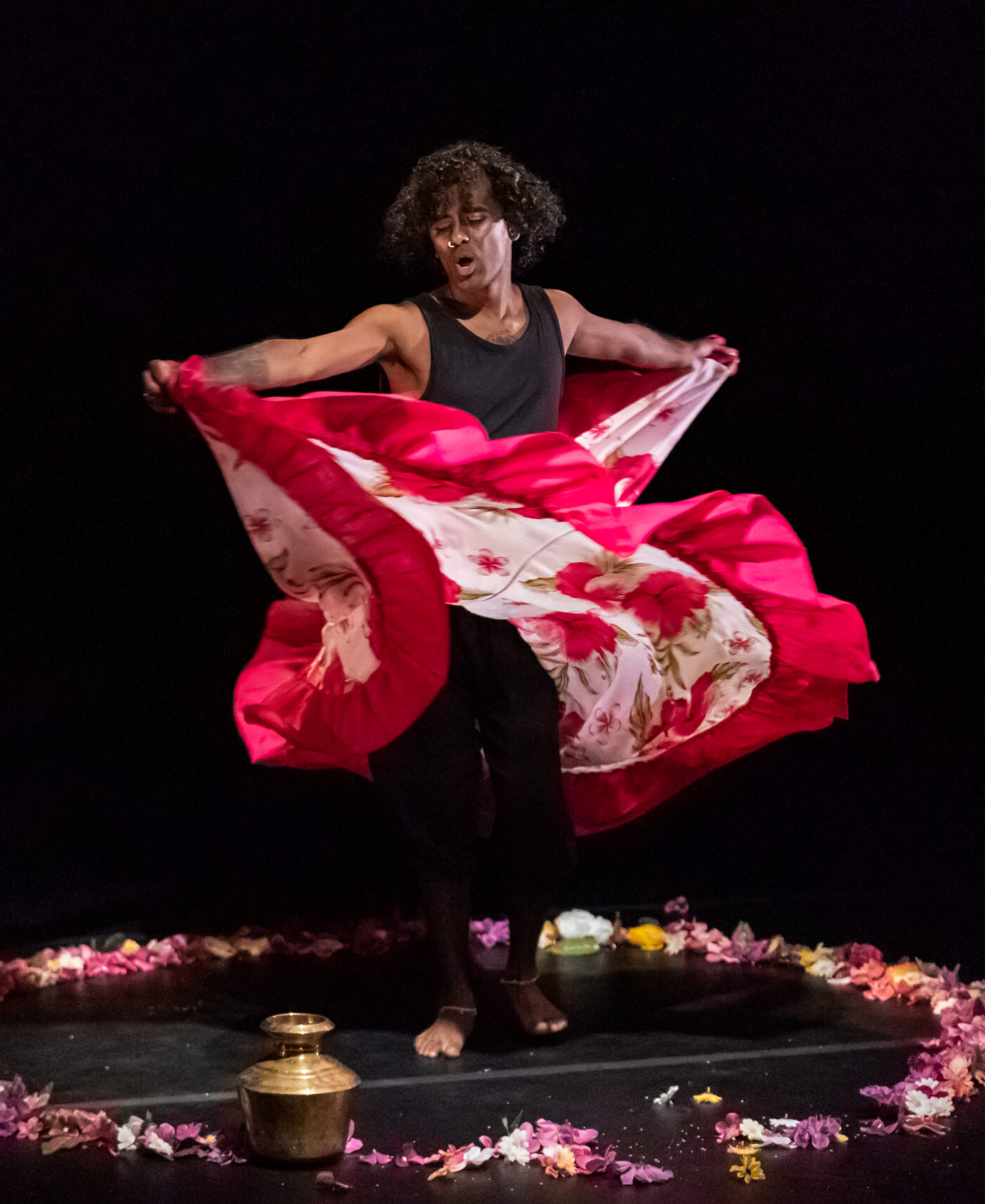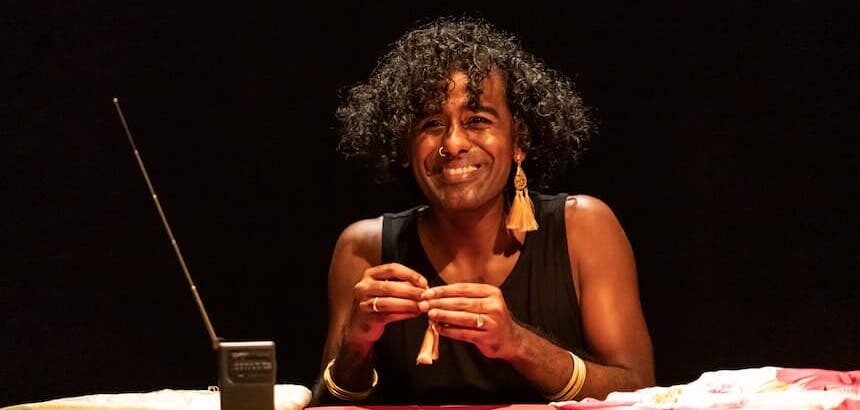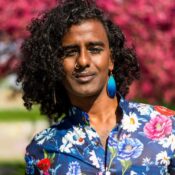ZOM-FAM finally gets to meet an audience! After two whole years where this show has been “in suspense,” during a time when all of us working in the arts, performance and cultural fields wondered whether we would ever get back to our work, find room for our bodies on a stage again and be able to commune with an audience… But here we are, and somehow, these two years of waiting for this work to be presented have taught me just as much as the four prior years I had spent developing the show.
In many ways, ZOM-FAM was never planned, it was a gift from the universe that came into my life and demanded to exist. I never sat down telling myself I am writing a manuscript. Between 2013-18, as I was finding my artistic voice through the art of the spoken word, I had written and performed a series of poems, at open mics and cabarets, most of which spoke about my childhood as a queer/trans child growing up in Mauritius. I had not realized at the time that if I threaded all these pieces together, there was a storyline asking to be narrated.
Poetry had always been my first love. There is something about the power of a few words strung together to conjure an image, a feeling, a statement, that has always appealed to me and left me in awe. I have always loved the nuanced and polymorphous meanings that poetry can take. When I had started working on ZOM-FAM as an interdisciplinary performance, I was at a point where I wanted to deepen my relationship with this first love of mine. I wanted to know: What if poetry could extend beyond the confines of the page and erupt onto a stage? What if the words could mould themselves into and through the physical body of a performer? What would it entail, aesthetically and politically, to have what I call “the body of the text” inhabit the body of a transgender, racialized performer? I wondered if this coming-into-body, this coming-into-space of the poetry would allow me to reclaim a form of sovereignty that had been historically denied to people like me. Would the word-in-performance allow me to birth myself into life, into storytelling?

I developed ZOM-FAM over many years, with the guidance of multiple creatives who helped me refine my artistic vision and bring it to fruition. I am particularly indebted to the MAI (Montréal, Arts Interculturels) who supported me through their mentorship and artistic development program. I had never worked on a show of this scale before. I am a grassroots artist who is community-taught and self-taught. Working towards this performance meant learning a new language, learning a new vocabulary through which arts institutions typically communicate. I went to countless workshops and talks, where I was almost always the only person of colour, in order to learn the language of the institution– how to speak about my project, how to write a grant application, how to network etc. Around me, in the Montreal context where I live and work, I was surrounded by white artists, all seemingly successful, who had graduated from prestigious art schools, who seemed to know their way around. Developing ZOM-FAM meant that I had to learn to push my way through spaces that were not meant for me, that did not want me, so my body and the artistic dreams it holds would be known and made manifest. I had to be willing to ask that “obvious question” that made everybody’s eyes roll. I had to be willing to make space for my own discomfort, to let it glide under my feet, across the floor, coat the walls and the ceiling, to let it become everybody’s discomfort. I would not shrink in shame, make myself disappear under everybody’s eye-roll. Working on this performance taught me to claim my space, unapologetically, however uncomfortable this might have been.
And then, there was the creative process itself. I remember the first time I found myself in the rehearsal studio, alone, with 25 pages of manuscript in my hands, staring into a wall-length mirror asking myself: “What am I supposed to do? How do I create a show?!” This creative process was long and arduous, like nothing I had experienced before. Working on ZOM-FAM made me face all of my insecurities, my most deep-seated fears. But this process also taught me how to make friends with my fears, how to allow the grumbling in my stomach to arise without taking over and circumscribing my muscles. This process taught me to remain present and grounded in my body, it taught me that every expression of fear and discomfort is a message, like any message, guiding me to my truest and most authentic form of expression. And that I need to learn to cultivate presence in my body, and to listen, receive and accept whatever might emerge in the process without judgment.
I thus started structuring my entire life, outside of the studio, around the development of this show. I started caring for my body in ways I had never before, in how I ate, how I exercised, how I slept, how I hydrated… I started developing daily rituals in which to ground myself, to make friends with my fears even when I was not working on the show. In many ways, developing this performance pushed me to ground myself in faith– faith in an artistic vision, faith in my own intuition, faith in the universe having my back. And the process of creating this work became an ongoing test of faith.
Which is why when ZOM-FAM was canceled not once, but twice, in 2020, it felt like disappointment but it did not feel like a loss. Deep inside, I knew that this work would find its audience– if the experience of working on this show has taught me anything, it is that it is important to honor the timing of creative work, to trust the process. When one remains grounded in a clear artistic intention, all one can do is surrender to that intention, and to hold on to the faith that only when 1- the artist is ready; 2- the work itself is ready; 3- the public is ready, do things align in the universe for the work to manifest.
I distinctly remember being in my technical residency back in October 2020, a couple of days before ZOM-FAM was due to premiere and listening to the live news when the Québec government announced that theatres across the province would be closing down effective immediately. On that same day, I got to perform the whole of ZOM-FAM for the very first time, with no audience but my creative team as witnesses. During this performance, the skies seemed to open over my head, and I was surrounded by the presence of my grandmothers, my femme lineage, my ancestors, chanting, dancing with me, taking in every word of my storytelling like a blessed offering I was pouring from a cup. And that moment was pure joy, pure alignment. Which is when I knew, in my bones, that all I could keep doing is trust the process, and that when the time would be right, when I would be ready, when the universe would be ready, ZOM-FAM would meet its audiences.
I am grateful and touched that this moment is expressing itself at Buddies in Bad Times Theatre, a performance space where I saw queer art for the very first time when I had just landed in Canada as an immigrant twelve years ago. I thank all those who have worked alongside me to bring this work to fruition, everyone who believed in my artistic vision. And to whomever will witness this work, I thank you too for holding these stories.
ZOM-FAM runs November 1-6 at Buddies. Click here for tickets and info.
Photo credit: Vanessa Fortin


